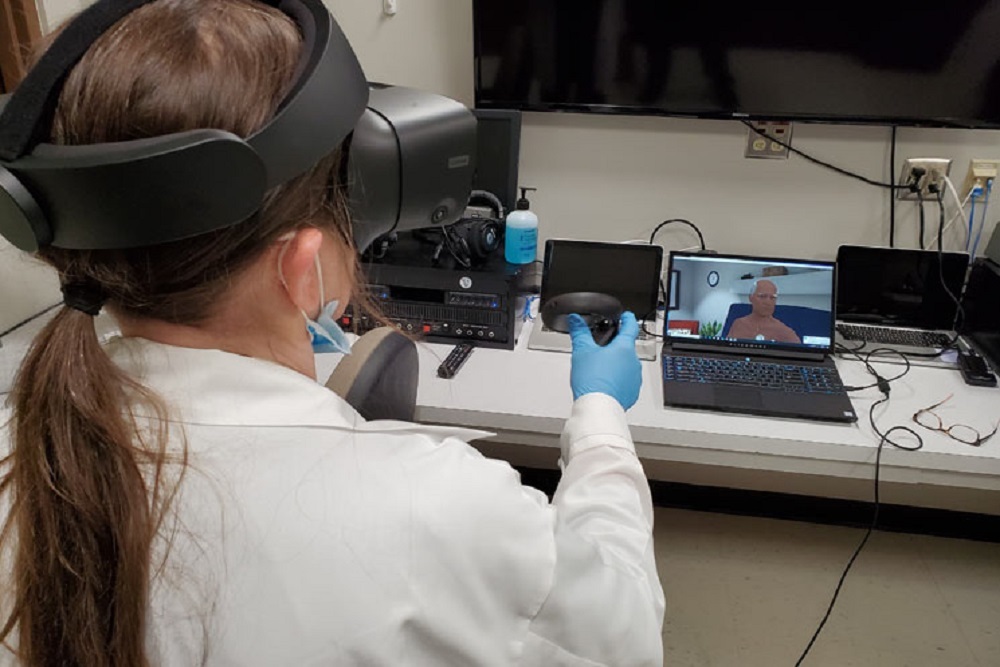Chippewa Valley Technical College issued the following announcement.
Deanna Hoyord, CVTC health care simulation technician, demonstrated the college’s new virtual reality simulator last week. She said it truly transports students into patient-centered scenarios.
Two programs at Chippewa Valley Technical College are enjoying the benefits of educating students with virtual reality systems.
Healthcare Simulation Week began Monday, so the timing was perfect for CVTC to roll out the health care virtual reality project it has been working on for more than a year. This virtual reality simulation is brand new and will be offered to students in a strategic way and in addition to other ways of learning to make sure they receive the best education possible.
The VR simulations used by CVTC were created by a Wisconsin Technical College System consortium project led by CVTC. The project, called Open Resources for Nursing (Open RN), is funded by a $2.5 million grant from the Department of Education.
The Open RN project team, comprised of faculty and simulation professionals throughout the state, is in the process of creating 25 open-source virtual reality scenarios and establishing five virtual reality centers at CVTC, Gateway, Madison, MPTC, and NWTC.
Deanna Hoyord, CVTC health care simulation technician, one of the first to demo CVTC’s virtual reality simulator recently, said it’s incredibly realistic – so much so that you forget it’s not real.
“Participating in virtual reality wearing VR headsets feels like you are really in that environment, caring for that patient,” Hoyord said. “The learning opportunities for students using virtual simulation are endless. The sky's the limit, and the future of VR is where it’s at.”
Healthcare Simulation Week, sponsored by the Society for Simulation in Healthcare, celebrates professionals who use health care simulation to improve the safety, effectiveness and efficiency of health care delivery. New methods and technologies that present enhanced opportunities to improve patient care are constantly emerging.
CVTC was recently recognized for providing quality health care simulation education when they received provisional accreditation from the Society for Simulation in Healthcare.
CVTC has had dozens of multidisciplinary simulations over the past decade to educate hundreds of health care students on using teamwork and communication skills.
Participants in multidisciplinary scenarios have included students in respiratory therapy, paramedic, emergency medical technician (EMTs), pharmacy technician and dental as well as residents from the onsite UW-Health clinic, now Prevea.
“CVTC health care programs regularly use simulation to provide students opportunities to practice providing safe patient care, especially during high-risk situations they may not normally experience during their clinical courses,” said Shelly Olson, executive dean of health, emergency services. By participating in simulation scenarios, CVTC students are known by local health care agencies as being well-prepared to provide quality patient care from the moment they graduate.”
In addition, fire rescue and EMS students will be immersed in a virtual emergency situation for training purposes. CVTC is the first to offer this kind of FLAIM system virtual reality training in the state.
“We are able to simulate real fire conditions like heat, smoke and situational awareness in an immersive learning environment with minimal resources,” said Mark Schwartz, CVTC fire and EMS continuing education coordinator. “It gives students a unique and innovative experience that is very life-like. It can be used in a one-on-one setting when typically, live fire training requires more than 10 people to accomplish. This will supplement the real-life fire training we do.”
Original source can be found here.



 Alerts Sign-up
Alerts Sign-up